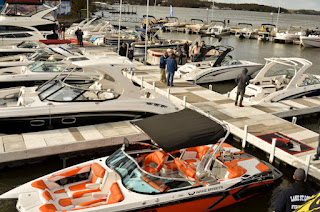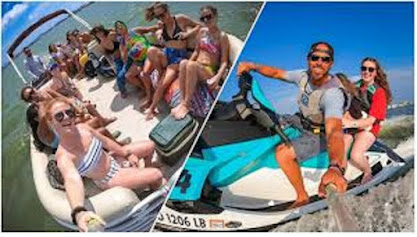Boating Terms and Trivia To Impress Your Friends
Ahoy, mateys! This be a fair and true listing of a few words and a little trivia as to the origin having to do with ships and sailing. These terms come mainly from the great age of sailing ships, the 16th to 18th centuries, and almost all hail from great seafaring peoples of the day, those being English, Norse, Dutch and German.
Freeboard Distance between waterline and main deck of a ship. Galley The word has made its way into most Western European languages. Originally "low, flat-built seagoing vessel of one deck," once a common type in the Mediterranean. Meaning "cooking range or cooking room on a ship" dates from 1750. Poop Deck Enclosed structure at stern of ship above main deck, ( yes it is used what you think) The term Head is nautical for toilet. in the days of sail. A plank was placed near the bow or prow of the ship. The plank over hung the ship edge over the water. that is where ships crew relieve themselves. The Officers were able to use an enclosed area on the poop deck. Mizzen Mast Aftermost fore-and-aft sail of a three-masted ship," early 15 century., mesan, via French misaine "foresail, foremast," altered (by influence of Italian mezzana "mizzen") from Old French migenne, from Catalan mitjana, from Latin medianus "of the middle" (from the root *medhyo- "middle"). The sense of the English and Italian words agree, but the etymology is off because the "middle" mast on a ship is the mainmast. Perhaps it refers to a sail of "middle" size, or the thing described changed. Klein suggests an alternate etymology of the French word, from Arabic via Italian. The mizzen-mast supports the mizzen-sail. Anchor "Device for securing ships to the ground under the water by means of cables," Old English ancor, borrowedmfrom Latin ancora "an anchor," from or cognate with Greek ankyra "an anchor, a hook," from root *ang-/*ank- "to bend" . A very early borrowing into English and said to be the only Latin nautical term used in the Germanic languages (German Anker, Swedish ankar, etc.). The unetymological -ch- emerged late 16 century., a pedantic imitation of a corrupt spelling of the Latin word. The figurative sense of "that which gives stability or security"Sail Old English segilan "travel on water in a ship; equip with a sail," from the same Germanic source as sail; cognate with Old Norse sigla, Middle Dutch seghelen, Dutch zeilen, Middle Low German segelen, German segeln. Meaning "to set out on a sea voyage, leave port" . Boat "small open vessel (smaller than a ship) used to cross waters, propelled by oars, a sail, or (later) an engine," Old English bat, from Proto-Germanic *bait- (source also of Old Norse batr, Dutch boot, German Boot), possibly from PIE root *bheid- "to split," if the notion is of making a boat by hollowing out a tree trunk or from split planking. Or it may be an extension of the name for some part of a ship.Ship Old English scip "ship, boat," from Proto-Germanic *skipa- (source also of Old Norse, Old Saxon, Old Frisian, Gothic skip, Danish skib, Swedish skepp, Middle Dutch scip, Dutch schip, Old High German skif, German Schiff), "Germanic noun of obscure origin" [Watkins]. Others suggest perhaps originally "tree cut out or hollowed out," and derive it from the root *skei- "to cut, split". Now a vessel of considerable size, adapted to navigation; the Old English word was used for small craft as well, and definitions changed over time; in 19 century., distinct from a boat in having a bowsprit and three masts, each with a lower, top, and topgallant mast. French esquif, Italian schifo are Germanic loan-words. Scuttlebutt Old English "cask of drinking water kept on a ship's deck, having a hole (scuttle) cut in it for a cup or dipper," from scuttle "opening in a ship's deck" scuttle + butt "barrel." Earlier scuttle cask (1777). Meaning "rumor, gossip" first recorded 1901, originally nautical slang, traditionally said to be from the sailors' custom of gathering around the scuttlebutt to gossip. Compare water-cooler, figurative for "workplace gossip" mid-20 century. Wheelhouse The term wheelhouse was first used in the mid-1800s to describe the area of a steamboat that enclosed its steering wheel. You can use the word to describe the part of any boat where the captain steers, though it's more common these days to call an actual wheelhouse a bridge or pilothouse. These are just a few terms and trivia to impress your friends . Your the Captain now! |





Comments
Post a Comment